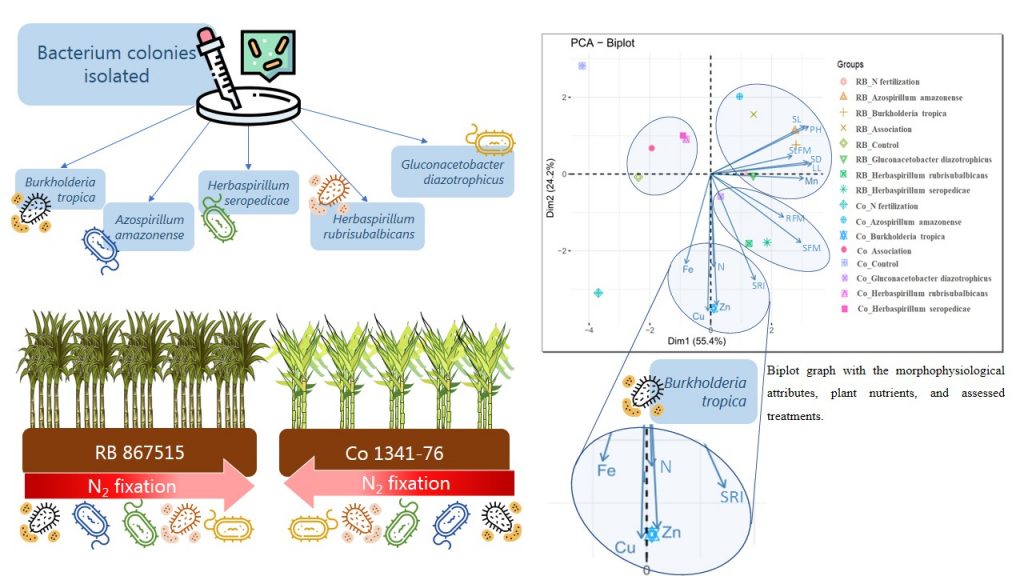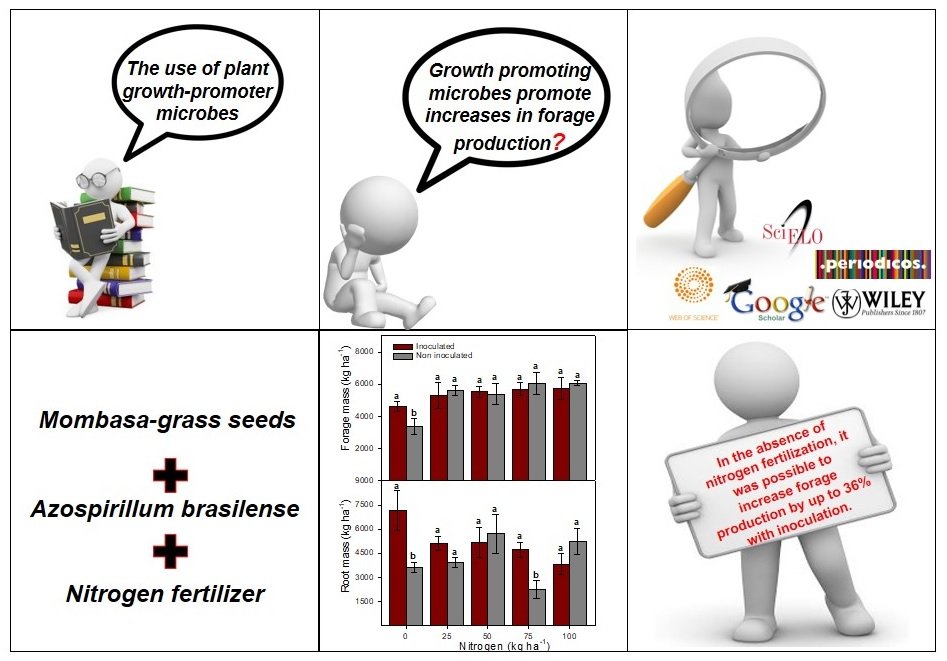Associative diazotrophic bacteria inoculated in sugarcane cultivars: implications on morphophysiological attributes and plant nutrition
01/Sep/2020
ABSTRACT Sugarcane is one of the first activities of economic importance in Brazil. The understanding of the nutritional dynamics at different phenological stages of the sugarcane crop with the use of nitrogen-fixing bacteria has been one of the alternatives to decrease fertilizer consumption and increasing plant production. This study aimed to assess the morphophysiological attributes in the initial growth and nutrition of two sugarcane varieties inoculated with strains of diazotrophic bacteria, individually and in an association, in a greenhouse. The […]
Mitigation of Mombasa Grass ( Megathyrsus maximus ) Dependence on Nitrogen Fertilization as a Function of Inoculation with Azospirillum brasilense
20/Aug/2019
ABSTRACT Using biological inputs to improve the efficiency of nitrogen fertilizers represents an alternative for the cultivation of grasses in tropical regions. Azospirillum brasilense is a species of plant growth promoting bacteria widely studied and used in inoculants. Thus, this study aimed to evaluate the performance of Mombasa grass ( Megathyrsus maximus ) in association with A. brasilense and nitrogen (N) fertilization. The study was conducted under field conditions in Araguaína-Tocantins State, between December 2017 and May 2018. The treatments […]
New Native Rhizobia Strains for Inoculation of Common Bean in the Brazilian Savanna
20/Feb/2017
ABSTRACT Maximization of biological nitrogen fixation in the common bean (Phaseolus vulgaris L.) crop depends on the genetic characteristics related to the plant, the symbiotic efficiency of rhizobia, and environmental factors. The objective of this study was to evaluate the performance of rhizobia selected beforehand from Cerrado (Brazilian tropical savanna) soils in Mato Grosso do Sul. The experiments were conducted in 2007 in the municipalities of Aquidauana, Anaurilândia, Campo Grande, and Dourados, all located in the state of Mato Grosso […]
Symbiotic effectiveness of Bradyrhizobium ingae in promoting growth of Inga edulis Mart. seedlings
18/Jan/2017
ABSTRACT Inga edulis Mart. is a leguminous tree adapted to acidic and low-fertility soils that establishes symbioses with nitrogen (N)-fixing bacteria. The identification of effective bacteria in biological N fixation may bolster the use of I. edulis in degraded or modified areas and agroforestry systems. Therefore, the aims of this study were evaluation of the symbiotic effectiveness of eight strains of the Bradyrhizobium genus native to Roraima in Inga edulis plants, and in vitro evaluation of the ability of the […]
Genetic Variability and Symbiotic Efficiency of Erythrina velutina Willd. Root Nodule Bacteria from the Semi-Arid Region in Northeastern Brazil
18/Jan/2017
ABSTRACT Legume-rhizobia symbiosis is a cross-kingdom association that results in large amounts of nitrogen incorporated in food webs. For the Brazilian semi-arid region, data on genetic variability and symbiotic efficiency of Papilionoidae rhizobial communities are very scarce. The aim of this study was to evaluate the genetic variability and the symbiotic efficiency of eight rhizobial isolates obtained from “mulungu” (Erythrina velutina Willd.) nodules. For 16S rRNA gene sequencing, the genomic DNA was extracted using a commercial kit, amplified with universal […]
Bradyrhizobium spp. Strains in Symbiosis with Pigeon Pea cv. Fava-Larga under Greenhouse and Field Conditions
09/Dec/2016
ABSTRACT: Optimization of symbiosis between nitrogen-fixing bacteria and legumes has been extensively studied, seeking agricultural sustainability. To evaluate the symbiotic efficiency of nitrogen-fixing bacterial strains belonging to the Bradyrhizobium genus with pigeon pea (Cajanus cajan (L.) Millsp.) cv. Fava-Larga, experiments were conducted in Leonard jars (axenic conditions), pots with soil, and in the field. Ten strains were tested in Leonard jars, and three strains, in addition to BR 29, were selected according to their ability to promote the growth of […]
Nodulations and Grain Yields of Common Beans in Response to Nitrogen Fertilization or Seed Inoculation with Rhizobium Freirei
01/Dec/2015
ABSTRACT Knowledge of the responses of bean plants as a function of N fertilization or seed inoculation with rhizobia can direct crops to different market niches in different technological levels. The roots nodulation and the yield grains of 10 bean cultivars on nitrogen fertilization and seed inoculation with Rhizobium freirei were evaluated aiming to identify, in terms of grain yield, the more efficient and responsive to nitrogen fertilization, as well to symbiotic N fixation in relation to N fertilization. Two […]
THE RESURRECTION PLANT TRIPOGON SPICATUS (POACEAE) HARBORS A DIVERSITY OF PLANT GROWTH PROMOTING BACTERIA IN NORTHEASTERN BRAZILIAN CAATINGA
01/Jul/2015
Plant species that naturally occur in the Brazilian Caatinga (xeric shrubland) adapt in several ways to these harsh conditions, and that can be exploited to increase crop production. Among the strategic adaptations to confront low water availability, desiccation tolerance stands out. Up to now, the association of those species with beneficial soil microorganisms is not well understood. The aim of this study was to characterize Tripogon spicatus diazotrophic bacterial isolates from the Caatinga biome and evaluate their ability to promote […]
RESPONSE OF COMMON BEAN TO RHIZOBIUM INOCULATION AND SUPPLEMENTAL MINERAL NITROGEN IN TWO BRAZILIAN BIOMES
01/Jul/2015
Common bean (Phaseolus vulgaris L.) may benefit from biological N 2 fixation, but inconsistent responses of the crop to rhizobium inoculation indicate the need for supplemental mineral N fertilization. In this study, we aimed to evaluate the response of the common bean crop to rhizobium inoculation in association with supplemental mineral N in the Cerrado (Brazilian tropical savanna) and Atlantic Forest biomes. Four field experiments were carried out, two in Santo Antônio de Goiás (State of Goiás), one in Valença […]
Inoculation of sugarcane with diazotrophic bacteria
01/Apr/2014
The sugarcane industry, a strategic crop in Brazil, requires technological improvements in production efficiency to increase the crop energy balance. Among the various currently studied alternatives, inoculation with diazotrophic bacteria proved to be a technology with great potential. In this context, the efficiency of a mixture of bacterial inoculant was evaluated with regard to the agronomic performance and N nutrition of sugarcane. The experiment was carried out on an experimental field of Embrapa Agrobiologia, in Seropédica, Rio de Janeiro, using […]


